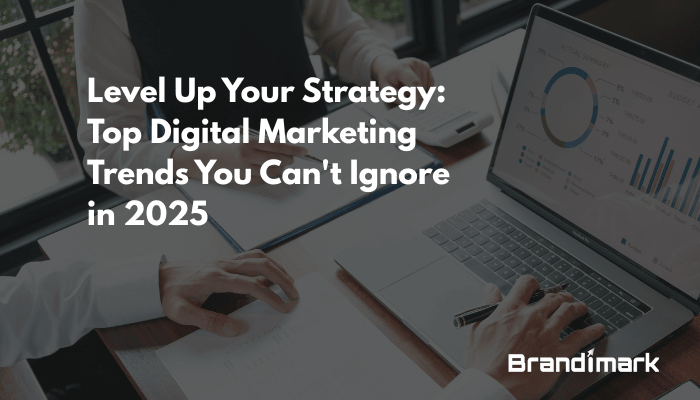The digital marketing landscape is constantly evolving at a breakneck pace. In 2025, staying ahead of the curve isn’t just beneficial—it’s absolutely vital for businesses aiming for sustained growth and relevance. New technologies, shifting user behaviors, and dynamic algorithm updates demand a proactive approach. Let’s dive into the top digital marketing trends your business needs to monitor and leverage to maintain a competitive edge in 2025.

1. The Rise of Mainstream AI-Powered Marketing
Artificial Intelligence (AI) has moved beyond the realm of futuristic concepts and is now a tangible force reshaping how brands connect with their audiences. From the intelligent automation of content creation using tools like ChatGPT, Midjourney, and Jasper, to sophisticated customer segmentation and the power of predictive analytics, AI is revolutionizing marketing workflows.
SEO Enhancement: Incorporating keywords like “AI in marketing,” “AI content generation,” “customer segmentation AI,” and “predictive analytics for marketing” will improve search visibility for users interested in these advancements.
Pro Tip for 2025: Businesses that strategically integrate AI for process automation and hyper-personalization will gain a significant competitive advantage. Explore AI tools that align with your content creation, customer relationship management, and data analysis needs.
2. Short-Form Video Content Reigns Supreme
The dominance of platforms like TikTok, Instagram Reels, and YouTube Shorts has unequivocally established short-form video as a powerhouse for audience engagement. Whether you’re showcasing product demonstrations, delivering concise educational content, or offering authentic behind-the-scenes glimpses, video content optimized for brevity and impact is no longer optional—it’s a fundamental pillar of a successful digital marketing strategy.
SEO Enhancement: Target keywords such as “short-form video marketing,” “TikTok marketing strategy,” “Instagram Reels for business,” and “YouTube Shorts guide” to attract users seeking information on leveraging these formats.
Action Step: Prioritize the creation of video-first content that is specifically designed and optimized for mobile consumption. Focus on capturing attention quickly and delivering value within a short timeframe.
3. Optimizing for the Growing Voice Search Landscape
The increasing adoption of smart assistants like Google Assistant, Amazon Alexa, and Apple Siri is making voice search an increasingly significant avenue for information discovery. Marketers must adapt their content optimization strategies to account for the natural, conversational language that users employ in voice queries, moving beyond traditional keyword targeting.
SEO Enhancement: Optimize for long-tail keywords and question-based queries. For example, instead of “best Dhaka coffee,” target phrases like “what is the best coffee shop in Dhaka open now?” or “directions to a good coffee place near me in Dhaka.”
Example for Dhaka: Instead of targeting “best coffee shop in Dhaka,” optimize for “Where is the best coffee shop in Dhaka with Wi-Fi?” or “What are the top-rated cafes in Dhanmondi, Dhaka?”
4. Navigating Zero-Click Searches and Leveraging Featured Snippets
Google’s evolving search results pages increasingly provide direct answers to user queries, often resulting in “zero-click searches” where users find the information they need without navigating to a website. This presents both a challenge and a significant opportunity for marketers.
SEO Enhancement: Focus on earning featured snippets, knowledge graph inclusions, and “People Also Ask” (PAA) placements by structuring your content to directly answer specific questions clearly and concisely.
Strategy Tip: Organize your content with clear headings, subheadings, bullet points, numbered lists, and comprehensive FAQs to enhance its chances of being featured prominently in search results. Think about the specific questions your target audience is asking and provide direct, valuable answers.
5. Embracing Ethical and Sustainable Marketing Practices
Today’s consumers, particularly Generation Z and Millennials, are increasingly discerning and place a high value on a brand’s ethical stance and commitment to sustainability. Marketing campaigns that authentically reflect transparency, ethical sourcing, and environmental responsibility resonate more powerfully than traditional, aggressive sales tactics.
SEO Enhancement: Incorporate keywords related to your brand’s values, such as “sustainable brand,” “ethical marketing,” “eco-friendly products,” “transparent business practices,” and “socially responsible marketing” if they align with your brand identity.
Brand Insight: Consumers are not just purchasing products or services; they are investing in the stories, missions, and core values that your brand embodies. Communicate your ethical and sustainable practices clearly and authentically.
6. First-Party Data: The New Strategic Asset
As the digital landscape prepares for a cookieless future with the phasing out of third-party tracking, the collection and strategic utilization of first-party data are becoming paramount. Building direct relationships with your audience through website interactions, email sign-ups, and loyalty programs, while offering genuine value in exchange for their information, will be crucial for personalized and effective marketing.
SEO Enhancement: While first-party data itself isn’t directly SEO-related, creating valuable content that encourages user engagement and data sharing (e.g., through gated content, email subscriptions) can indirectly improve your SEO by increasing website traffic and user interaction metrics. Focus on keywords related to the value proposition you offer in exchange for data, such as “email marketing strategy,” “lead generation tactics,” and “building customer relationships.”
Final Thoughts for 2025
Digital marketing in 2025 demands a holistic approach that is not only data-driven and technologically savvy but also deeply human-centric. While the tools and platforms will continue to evolve, the fundamental goal remains the same: to forge meaningful connections with your target audience. Brands that proactively adapt to these emerging trends, prioritize value-driven content, and build trust will undoubtedly lead the way in the dynamic digital landscape of 2025.
